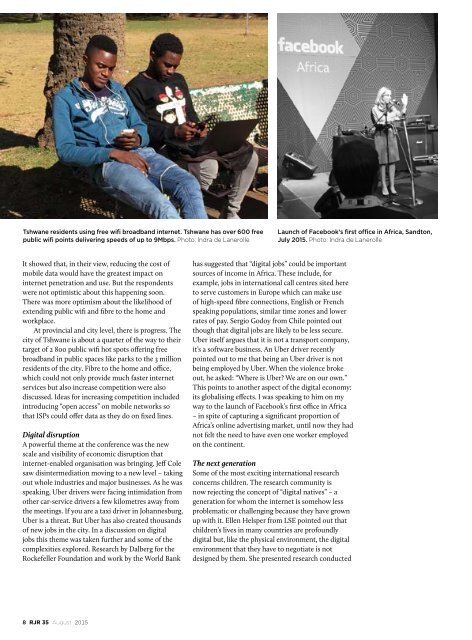Full RJR35
Create successful ePaper yourself
Turn your PDF publications into a flip-book with our unique Google optimized e-Paper software.
One Laptop per<br />
child in Uruguay.<br />
Children’s lives in<br />
many countries<br />
are profoundly<br />
digital but, like<br />
the physical<br />
environment,<br />
the digital<br />
environment<br />
that they have to<br />
negotiate is not<br />
designed by them.<br />
in over 30 countries over the last decade on children’s<br />
use of and attitudes towards the internet. Her work<br />
offered a challenge to the approach taken by the Film<br />
and Publication Board in their attempt to tackle<br />
children’s exposure to online content but also raised<br />
some questions for the FPB’s critics. She said that<br />
pornography is children’s greatest fear. They are also<br />
worried about seeing real violence, especially when<br />
it involves children. They want to be warned about<br />
this – especially visual content. But she also reported<br />
that children do not want to be excluded from online<br />
environments that give them pleasure and joy. And<br />
their own views of what is disturbing or upsetting<br />
are not always the same as what adults think it is or<br />
should be. Helsper suggested that the best way of<br />
managing these issues would be a multi-stakeholder<br />
approach including children, parents, online content<br />
providers and the state. It was good to see the head<br />
of research for the FPB present at the event. She told<br />
me she is planning further research.<br />
Matías Dodel from Uruguay looked at a<br />
different aspect of the children’s internet: its use<br />
in education. He reported on the One Laptop Per<br />
Child (OLPC) programme, originally started by<br />
Nicolas Negroponte, the former director of the<br />
MIT Media Lab. Uruguay is the only country in the<br />
world where OLPC has been fully implemented<br />
on a national scale. In a population of a little more<br />
than 3-million people, more than 600 000 laptops<br />
have been distributed. As well as a computer, every<br />
child is given a free mobile internet connection. All<br />
textbooks are available free on their computers.<br />
The Gauteng education department has recently<br />
launched a pilot tablet programme in selected<br />
schools. Though Dodel was careful to note that<br />
national contexts may vary greatly, his list of success<br />
factors in Uruguay – institutional design, addressing<br />
teachers mistrust and fears, and building strong<br />
public/private partnerships – might be relevant to<br />
education authorities designing ICT and internet<br />
programmes here.<br />
The next 4-billion<br />
An important focus of the South African research<br />
presented was on “mobile-centric” or .mobi internet<br />
use. As internet penetration has increased, the<br />
number of PCs has not. An important body of<br />
research in South Africa over the last five years has<br />
focused on how people who are largely dependent on<br />
mobile phones and mobile networks use the internet.<br />
Mobile-centric use is also a global phenomenon as<br />
research from China and the US shows. Cole went<br />
as far as to suggest that in the near future less than<br />
10% of the population would use laptop or desktop<br />
computers.<br />
But if the future is mobile, the mobile-centric<br />
present imposes severe constraints on many of<br />
its users. Marion Walton from UCT described the<br />
“pavement internet” – the strategies people on low<br />
incomes use to share internet content. Low income<br />
users pay more for data than middle-class and rich<br />
users. One GB of data on Vodacom, the largest<br />
2015 August RJR 35 9


